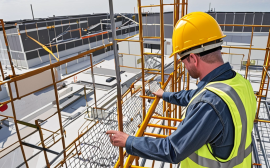Introduction: Protecting Your Home Starts with the Right Roof
Your roof. It’s more than just shingles and beams; it’s the shield that protects your family, your belongings, and your peace of mind. A well-maintained roof stands as a silent guardian against the elements, while a compromised one can lead to costly repairs and significant stress, potentially manifesting as roof repair needs. Finding the right roofing contractor is paramount, but navigating the landscape of local professionals can feel overwhelming. This guide provides a clear, step-by-step approach to researching, vetting, and selecting a reputable roofing contractor in your area, ensuring your home remains protected for years to come.
Focusing on the period between 2010 and 2019, this article provides insights into best practices for homeowners actively seeking roofing services or planning future projects. This timeframe represents a period of significant advancements in roofing materials and techniques, making it a relevant benchmark for evaluating current roofing practices. One of the initial challenges homeowners face is identifying reliable ‘roofing contractors near me’. The sheer volume of search results can be daunting, making it crucial to filter for experience and expertise.
Beyond a simple search, understanding the nuances of different roofing systems, such as the asphalt vs metal roofing comparison, is essential for making informed decisions. Asphalt shingles remain a popular choice due to their cost-effectiveness and ease of installation, while metal roofing offers superior durability and longevity, albeit at a higher initial investment. Evaluating these options requires a thorough understanding of your budget, aesthetic preferences, and the specific climate conditions in your region. Moreover, proactive roof maintenance best practices are key to extending the lifespan of any roofing system.
Regular inspections, clearing debris from gutters, and addressing minor repairs promptly can prevent small issues from escalating into costly roof replacement projects. Understanding the signs of potential problems, such as missing shingles, water stains on ceilings, or granule loss from asphalt shingles, allows homeowners to take swift action and avoid further damage. When seeking ‘best roofing companies’, it’s crucial to verify their credentials, including their roofing license and roofing insurance, to ensure they meet industry standards and provide adequate protection.
Reading ‘roofing contractor reviews’ and requesting references from past clients can also offer valuable insights into their workmanship and customer service. Being aware of potential ‘roofing scams’, such as contractors who demand full payment upfront or lack proper licensing, is essential for protecting yourself from fraudulent practices. A solid roofing warranty from both the contractor and the manufacturer provides additional peace of mind, covering potential defects in materials or workmanship. Knowing ‘how to choose a roofing contractor’ wisely ensures the long-term integrity of your home’s defense against the elements.
Step 1: Define Your Needs and Utilize Online Resources
Before diving into the search for roofing contractors near me, rigorously define your project’s scope. Are you dealing with a minor, localized roof repair, perhaps stemming from a few missing shingles? Or is the damage more widespread, indicating a potential need for roof replacement? Perhaps you’re proactively considering an upgrade from asphalt to metal roofing? Accurately assessing the extent of the problem – or the desired improvement – will significantly streamline the selection process and allow you to communicate effectively with potential contractors.
This clarity also enables a more precise understanding of the costs involved and helps in evaluating the value proposition of different roofing companies. Start your preliminary research online. Google, Yelp, and the Better Business Bureau (BBB) remain excellent starting points for identifying potential candidates. Search for terms like ‘best roofing companies’ and ‘roofing contractor reviews’ to gauge public perception. Scrutinize the number of reviews, overall ratings, and the detailed content of the comments. Look for patterns – are there recurring themes, both positive and negative?
A company with consistently positive feedback, particularly regarding responsiveness, quality of workmanship, and adherence to timelines, is a promising sign. However, be equally attentive to negative reviews, paying close attention to how the company addressed the concerns raised. This provides valuable insight into their customer service and problem-solving capabilities. Beyond general review sites, delve into industry-specific platforms and forums. These resources often provide more nuanced and technical feedback on roofing contractors, discussing aspects like their expertise with specific roofing materials (asphalt, metal, tile, etc.), their adherence to building codes, and their experience with different types of roofing systems.
Furthermore, investigate the roofing contractor’s online presence beyond reviews. Does their website showcase completed projects, highlight their certifications, and clearly outline their services? A professional and informative online presence is often indicative of a reputable and established company. Remember to cross-reference information from multiple sources to form a comprehensive understanding of each contractor’s capabilities and reputation. This is a crucial step in creating daily rituals that matter and how to choose a roofing contractor wisely and avoid potential roofing scams. Finally, ascertain if the roofing contractor has a valid roofing license and adequate roofing insurance.
Licensing ensures they meet the minimum qualifications to operate legally in your area, while insurance protects you from liability in case of accidents or damage during the project. Don’t hesitate to ask for proof of both; reputable contractors will readily provide this documentation. Also, inquire about the roofing warranty offered, both on materials and workmanship. A solid roofing warranty provides peace of mind and protects your investment against premature failure or defects. Verifying these credentials is an essential step in ensuring you’re working with a qualified and trustworthy professional for your roof repair or replacement needs.
Step 2: Verify Licensing, Insurance, and Certifications
Licensing, insurance, and bonding are non-negotiable when searching for roofing contractors near me. A roofing license signifies that the contractor has met the necessary qualifications to operate legally within your state or locality. This often involves passing examinations and demonstrating knowledge of building codes and safety regulations. Failing to verify a roofing license could expose you to working with unqualified individuals, potentially leading to substandard work and code violations. For example, a homeowner in California who hired an unlicensed contractor later discovered that the roof was improperly installed and didn’t meet earthquake safety standards, resulting in significant additional expenses to rectify the situation.
Always check with your local licensing board to confirm the contractor’s credentials and ensure they are in good standing; this simple step can save you considerable trouble down the line. Insurance, particularly liability and workers’ compensation, is paramount. Liability insurance protects you from financial responsibility if damage occurs to your property during the roof repair or roof replacement process. Workers’ compensation covers medical expenses and lost wages if a worker is injured on your property.
Without adequate insurance, you could be held liable for these costs, potentially leading to significant financial strain. Before hiring any of the best roofing companies, request certificates of insurance and verify their validity directly with the insurance provider. Consider a scenario where a roofing worker falls off your roof and sustains injuries; without proper workers’ compensation coverage, you, as the homeowner, could be sued for medical bills and lost income. This highlights the critical importance of verifying insurance coverage.
Bonding provides a layer of financial security. A surety bond protects you if the roofing contractor fails to complete the job according to the contract or doesn’t meet their contractual obligations. If, for instance, a roofing contractor abandons the project mid-way or performs substandard work that requires rectification, you can file a claim against the bond to recover your financial losses. While bonding may not be legally required in all areas, it demonstrates the contractor’s commitment to professionalism and ethical business practices.
When evaluating how to choose a roofing contractor, remember that a bonded contractor has a financial incentive to uphold their promises and deliver satisfactory results. This added protection offers peace of mind and safeguards your investment. Beyond the basic requirements, roofing certifications from manufacturers like GAF (Master Elite), Owens Corning (Preferred Contractor), and CertainTeed (SELECT ShingleMaster) indicate that the contractor has undergone specialized training and meets specific quality standards. These certifications aren’t mandatory for all roofing contractors, but they often signify a higher level of expertise and commitment to quality installation practices, particularly relevant when considering asphalt vs metal roofing. Furthermore, check roofing contractor reviews from multiple sources, but also consider the roofing warranty offered. A strong warranty, backed by both the contractor and the manufacturer, demonstrates confidence in the quality of their work and materials. Be especially wary of door-to-door contractors offering unsolicited roofing services, particularly after a storm; these are often signs of roofing scams. Thoroughly vetting credentials is a key step in avoiding potential problems and ensuring a successful roofing project.
Step 4: Request and Compare Detailed Quotes
Contact at least three roofing contractors near me and request detailed, written quotes. A comprehensive quote should include a precise scope of work, specifying every task from tear-down to cleanup, the materials to be used (brand, type, and quantity), labor costs broken down by activity, a realistic timeline for completion, and crystal-clear payment terms. Scrutinize each line item; vague descriptions are a red flag. Be wary of estimates that are significantly lower than others, as this could indicate substandard materials, unqualified labor, or even a potential roofing scam.
Remember, the best roofing companies prioritize transparency and thoroughness in their estimates. Ask key questions to gauge the contractor’s expertise and commitment to quality. What type of roofing materials do you recommend for my roof and why, considering factors like local climate and architectural style? What warranties do you offer on both materials and workmanship, and what are the specific terms and conditions? What is your installation process, and how do you ensure proper ventilation and weatherproofing?
How will you protect my property, including landscaping and exterior features, during the roof repair or roof replacement project? How do you handle unexpected issues or delays, and what is your communication protocol? Their answers will reveal their expertise, professionalism, and dedication to customer satisfaction, helping you understand how to choose a roofing contractor wisely. Beyond the quote itself, delve into the contractor’s credentials. Confirm their roofing license is current and valid in your locality, and verify their roofing insurance coverage, including both liability and workers’ compensation.
Don’t hesitate to ask for proof of insurance directly from the insurance provider. Research roofing contractor reviews online, paying attention to both positive and negative feedback, but remember that online reviews are only one piece of the puzzle. A roofing warranty is only as good as the company that stands behind it, so prioritize established contractors with a proven track record. By taking these steps, you’ll be well-equipped to identify red flags and make an informed decision, protecting your home and your investment.
Step 5: Verify References and Understand Contract Terms
Before committing to a roofing contractor, due diligence is paramount. Request a detailed list of references from projects completed within the last few years. Contacting these past clients provides invaluable insights into the contractor’s work ethic, communication style, and overall project management. Ask specific questions: Were they satisfied with the quality of the roof repair or roof replacement? Was the project completed on time and within the agreed-upon budget? Did the roofing contractors near me address any concerns promptly and professionally?
Don’t hesitate to inquire about potential challenges encountered and how the contractor resolved them. This process helps differentiate the best roofing companies from those who may cut corners. Beyond references, request to see a portfolio showcasing completed projects similar to yours. Pay close attention to the details of the workmanship: Are the shingles aligned correctly? Are the flashing and seals properly installed? Does the overall appearance reflect quality and attention to detail? A reputable contractor will be proud to showcase their work and should readily provide examples.
This visual assessment is crucial, especially when considering an asphalt vs metal roofing comparison, as the installation techniques and aesthetic results differ significantly. Also, remember to check roofing contractor reviews online, but always balance online opinions with direct conversations with references. Finally, the contract is the definitive agreement. Before signing, scrutinize every clause. The scope of work must be clearly defined, specifying all tasks to be performed, materials to be used (including brand and grade), and any necessary permits.
The timeline should outline key milestones and the estimated completion date. The payment schedule should be reasonable, with an initial deposit followed by progress payments tied to specific milestones, and a final payment upon satisfactory completion. Critically, verify the roofing warranty details, including the duration and what is covered. Ensure the contract includes proof of roofing license and roofing insurance. Be especially vigilant for common roofing scams, such as inflated prices after a storm or demands for full payment upfront. Understanding these contract terms is essential to protecting your investment and ensuring a successful roofing project. If anything is unclear, seek legal advice before proceeding. Knowing how to choose a roofing contractor involves protecting yourself from the start.
Step 6: Identify Red Flags and Emphasize Long-Term Value
Vigilance is paramount in the final stages of selecting roofing contractors. Red flags should immediately raise concerns: high-pressure sales tactics, demands for full upfront payment, or the absence of a valid roofing license and adequate roofing insurance. Door-to-door contractors offering unsolicited services, particularly following severe weather events, often signal roofing scams. Reputable best roofing companies prioritize transparency and customer education, providing detailed contracts and payment schedules tied to project milestones. Always verify a contractor’s roofing license through your local regulatory agency and confirm their insurance coverage to protect yourself from liability.
Remember, a roofing warranty is only as good as the company that stands behind it, so longevity and reputation are crucial. Investing in a qualified roofing professional is a strategic, long-term investment in your home’s structural integrity and market value. A properly executed roof repair or roof replacement, using high-quality materials and adhering to best practices, can extend the lifespan of your roof by decades. While the allure of lower bids from less experienced or unscrupulous contractors might be tempting, the potential for substandard workmanship, material shortcuts, and future complications far outweighs any initial cost savings.
Prioritize finding experienced roofing contractors near me who possess a proven track record of excellence and a commitment to customer satisfaction. Before making a final decision, meticulously review roofing contractor reviews and testimonials from previous clients. Pay close attention to comments regarding the contractor’s communication, punctuality, cleanliness, and adherence to the agreed-upon scope of work. Positive feedback regarding their responsiveness to concerns and willingness to address any issues that may arise is a strong indicator of a reliable and trustworthy professional. Understanding how to choose a roofing contractor involves more than just comparing prices; it requires a comprehensive assessment of their qualifications, experience, and commitment to quality. A well-informed decision safeguards your investment and ensures the long-term protection of your home.



